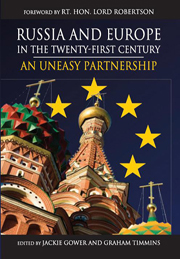Book contents
- Frontmatter
- Contents
- List of Contributors
- Acknowledgements
- List of Abbreviations/Acronyms
- Foreword Russia and Europe
- Preface
- Introduction Russia and Europe: What Kind of Partnership?
- PART 1 Russia looking West
- PART 2 Europe looking East
- Chapter 7 The European Union's Policy on Russia: Rhetoric or Reality?
- Chapter 8 The Role of Norms and Values in the European Union's Russia Policy
- Chapter 9 NATO and Russia: Progress or Process?
- Chapter 10 German-Russian Bilateral Relations and EU Policy on Russia: Reconciling the Two-Level Game?
- Chapter 11 Shortcut to Great Power: France and Russia in Pursuit of Multipolarity
- Chapter 12 A Europe Divided by Russia?: The New Eastern Member States and the EU's Policy towards the East
- PART 3 Partnership in Practice
- Conclusion Russia and Europe: An Uneasy Partnership 289
- Index
- More Titles in this series
Chapter 9 - NATO and Russia: Progress or Process?
from PART 2 - Europe looking East
Published online by Cambridge University Press: 05 March 2012
- Frontmatter
- Contents
- List of Contributors
- Acknowledgements
- List of Abbreviations/Acronyms
- Foreword Russia and Europe
- Preface
- Introduction Russia and Europe: What Kind of Partnership?
- PART 1 Russia looking West
- PART 2 Europe looking East
- Chapter 7 The European Union's Policy on Russia: Rhetoric or Reality?
- Chapter 8 The Role of Norms and Values in the European Union's Russia Policy
- Chapter 9 NATO and Russia: Progress or Process?
- Chapter 10 German-Russian Bilateral Relations and EU Policy on Russia: Reconciling the Two-Level Game?
- Chapter 11 Shortcut to Great Power: France and Russia in Pursuit of Multipolarity
- Chapter 12 A Europe Divided by Russia?: The New Eastern Member States and the EU's Policy towards the East
- PART 3 Partnership in Practice
- Conclusion Russia and Europe: An Uneasy Partnership 289
- Index
- More Titles in this series
Summary
Introduction
As its title implies, this book is concerned with the nature of Russia's relationship with Europe. In that context, the NATO-Russia dimension poses a specific consideration in that the North Atlantic Treaty Organization (NATO) is much larger than European NATO. Consequently, there is a temptation to disaggregate NATO in order to focus upon its ‘European-ness’ in terms of its interaction with Moscow. The temptation should be resisted, however. It may in theory be possible to disaggregate NATO by separating out its North American and European components, but no meaningful discussion of Europe's security relationship with Russia is possible if it fails to acknowledge the primacy of the US in guiding, if not determining, the existence and persistence of NATO. One may write of the Alliance without specific reference to, say, the views of some of its smaller European members: indeed, in a sense, one may even discuss historical NATO views or positions without reference to France, given its history of autonomy from the military structures. However, any understanding of post-Cold War NATO, including the relationship with the Russian Federation, must contend with the views of Washington and the consequences thereof for its European allies, as will be discussed below. To that extent, nothing much has altered since the Cold War and the US remains, as Richard Holbrooke described it a decade ago, a European power. NATO-Russia interaction as examined here will reflect that fact.
- Type
- Chapter
- Information
- Russia and Europe in the Twenty-First CenturyAn Uneasy Partnership, pp. 149 - 168Publisher: Anthem PressPrint publication year: 2007



